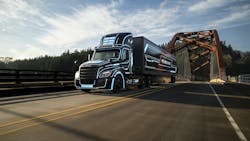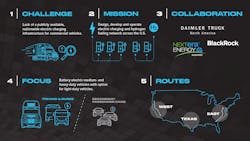DTNA leads venture to create U.S. charging network for large trucks
Daimler Truck North America is partnering with energy providers to create a nationwide charging network for medium- and heavy-duty vehicles running on battery-electric and hydrogen fuel cells that is expected to break ground next year.
DTNA, NextEra Energy Resources, and BlackRock Renewable Power signed a memorandum of understanding to split the costs and lay the foundation for a joint venture to design, develop, install, and operate a U.S. charging network, the companies announced on Jan. 31. Operation planning is expected this year before initial site construction in 2023. Initial funding is expected to cost about $650 million.
"The planned joint venture with NextEra Energy Resources and BlackRock is another building block in our global partnership strategy to accelerate the infrastructure required for carbon-neutral commercial transportation,” said Martin Daum, CEO of Daimler Truck. “Whether in the U.S. or in Europe, these kinds of collaborations are essential to successfully tackle the urgent need for zero-emission vehicles. Daimler Truck North America, together with its two new allies, is taking the wheel and paving the way for a nationwide infrastructure for battery-electric and hydrogen-powered commercial vehicles in the U.S.”
See also: Daimler Truck to ramp down ICE spending, focus on ZEVs
The parties plan to build a network of charging sites on critical freight routes along the East and West Coasts and in Texas by 2026, leveraging existing infrastructure and amenities while adding complementary greenfield sites to fulfill anticipated customer demand.
Creating a roadmap for EV trucking
This is the latest in a line of joint ventures Daimler Trucks is creating with transformation technology companies. Daimler is also working with Shell, BP, and TotalEnergies on electric charging or hydrogen refueling infrastructure along essential transport routes. The OEM also partnered with Siemens Smart Infrastructure, ENGIE, EVBox Group, and Power Electronics in battery-electric charging to enable the economical use of CO2-neutral trucks in driving operations. Moreover, Daimler’s planned joint venture with Traton Group and Volvo Group for a European high-performance charging network is expected to contribute toward a carbon-neutral transport industry.
Like in Europe, the lack of a publicly available, nationwide electric charging infrastructure for commercial vehicles in the U.S., especially for long-haul freight operations, remains one of the most significant barriers to the widespread deployment of electric trucks. With the formation of this DTNA-led venture, the three parties will pool resources to address this U.S. commercial vehicle charging challenge.
The initial focus in the U.S. will be on charging stations for battery electric medium- and heavy-duty vehicles, followed by hydrogen fueling stations for fuel cell trucks, according to DTNA. The sites will also be available for light-duty vehicles to serve the greater goal of electrifying mobility.
Daimler plans to start producing battery-electric Freightliner eCascadia and Freightliner eM2 in 2022-2023. DTNA began taking North American orders for the EVs in 2021. The new joint venture to build out charging infrastructure will also lean on DTNA’s experience of providing consultant services to its customers, including some of the largest fleet operators in North America.
In cooperation with the DTNA headquarters’ local utility company, Portland General Electric, DTNA opened the first-of-its-kind public charging site for commercial vehicles in the U.S. in Portland, Oregon. NextEra Energy Resources is a significant investor in electric infrastructure and brings experience optimizing renewable energy and grid integration. BlackRock Renewable Power operates one of the world's largest renewable power equity investment platforms. BlackRock’s Global Renewable Power group seeks to invest across the spectrum of renewable power and energy transition supporting infrastructure globally, with over $9.5 billion in total commitments and investments in over 350 wind and solar projects across 15 countries and five continents. BlackRock’s Renewable Power group is a part of BlackRock Real Assets.
About the Author
FleetOwner Staff
Our Editorial Team
Kevin Jones, Editorial Director, Commercial Vehicle Group
Josh Fisher, Editor-in-Chief
Jade Brasher, Senior Editor
Jeremy Wolfe, Editor
Jenna Hume, Digital Editor
Eric Van Egeren, Art Director

